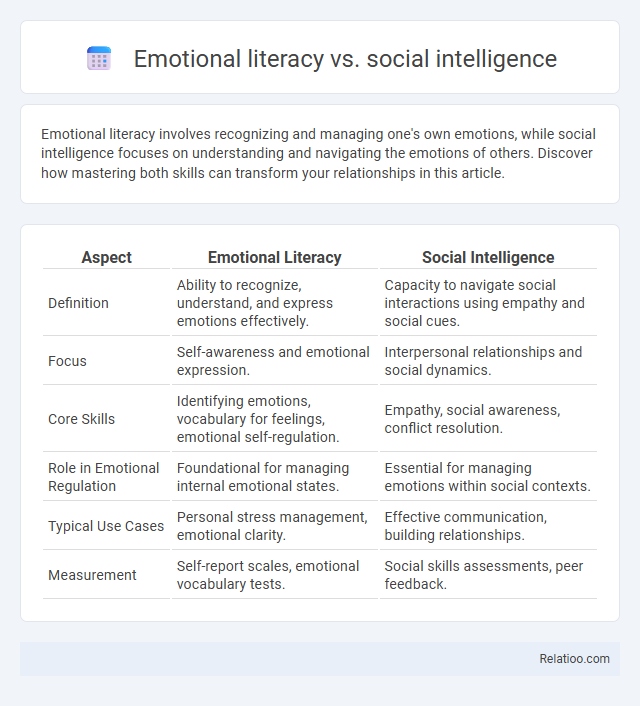Emotional literacy involves recognizing and managing one's own emotions, while social intelligence focuses on understanding and navigating the emotions of others. Discover how mastering both skills can transform your relationships in this article.
Table of Comparison
| Aspect | Emotional Literacy | Social Intelligence |
|---|---|---|
| Definition | Ability to recognize, understand, and express emotions effectively. | Capacity to navigate social interactions using empathy and social cues. |
| Focus | Self-awareness and emotional expression. | Interpersonal relationships and social dynamics. |
| Core Skills | Identifying emotions, vocabulary for feelings, emotional self-regulation. | Empathy, social awareness, conflict resolution. |
| Role in Emotional Regulation | Foundational for managing internal emotional states. | Essential for managing emotions within social contexts. |
| Typical Use Cases | Personal stress management, emotional clarity. | Effective communication, building relationships. |
| Measurement | Self-report scales, emotional vocabulary tests. | Social skills assessments, peer feedback. |
Understanding Emotional Literacy
Understanding emotional literacy involves recognizing, expressing, and managing one's own emotions effectively, which forms the foundation for healthy interpersonal relationships. Emotional literacy differs from social intelligence, which encompasses the broader ability to navigate social environments and understand others' thoughts and feelings. While emotional literacy focuses on internal emotional awareness, social intelligence extends to external social cues and adaptive interaction strategies.
Defining Social Intelligence
Social intelligence refers to the ability to effectively navigate social environments by understanding and managing interpersonal relationships, recognizing social cues, and adapting behavior accordingly. Emotional literacy involves identifying, understanding, and expressing one's own emotions accurately, while emotional intelligence extends this to managing emotions in oneself and others to foster positive interactions. Defining social intelligence emphasizes skills such as empathy, social awareness, and communication proficiency critical for successful social functioning.
Key Differences Between Emotional Literacy and Social Intelligence
Emotional literacy involves recognizing, understanding, and expressing one's own emotions effectively, while social intelligence centers on navigating social environments and interpreting others' emotions and social cues. Key differences include emotional literacy's emphasis on self-awareness and emotional regulation, whereas social intelligence prioritizes empathy, interpersonal skills, and social adaptability. Developing emotional literacy enhances intrapersonal emotional management, whereas social intelligence facilitates successful social interactions and relationships.
Core Components of Emotional Literacy
Emotional literacy encompasses the core components of recognizing, understanding, and managing your own emotions, which forms the foundation for effective interpersonal interactions. Unlike social intelligence, which emphasizes navigating social environments and relationships, emotional literacy focuses mainly on personal emotional awareness and expression. Developing strong emotional literacy skills enhances your ability to empathize with others and respond thoughtfully, creating better emotional connections.
Fundamental Elements of Social Intelligence
Emotional literacy involves recognizing and understanding your own emotions, while social intelligence focuses on interpreting social cues and effectively interacting with others in various contexts. The fundamental elements of social intelligence include empathy, social skills, and social awareness, enabling you to navigate complex interpersonal dynamics successfully. Developing these skills enhances your ability to build meaningful relationships and respond appropriately to social situations.
The Role of Emotions in Social Interactions
Emotional literacy involves recognizing, understanding, and managing one's emotions, which is crucial for effective communication and empathy in social interactions. Social intelligence expands on this by incorporating the ability to navigate complex social environments, interpret social cues, and respond appropriately to others' emotions. The interplay of emotional literacy and social intelligence enhances relationship building and conflict resolution, as emotions provide essential information that guides social behavior and decision-making.
Benefits of Developing Emotional Literacy
Developing emotional literacy enhances self-awareness by helping individuals recognize and articulate their emotions accurately, leading to better emotional regulation and reduced stress. This skill supports healthier relationships through improved empathy and communication, fostering trust and effective conflict resolution. Emotional literacy also boosts social intelligence by enabling nuanced understanding of both personal and others' emotional cues, promoting collaboration and social harmony.
Advantages of Enhancing Social Intelligence
Enhancing social intelligence improves your ability to navigate complex social environments by recognizing and responding to the emotions and behaviors of others effectively. It promotes stronger interpersonal relationships, better conflict resolution, and increased empathy compared to focusing solely on emotional literacy. Developing social intelligence leads to improved communication skills and greater success in both personal and professional interactions.
Practical Strategies to Improve Both Skills
Developing emotional literacy enhances your ability to recognize and manage your emotions, while social intelligence focuses on understanding and navigating social interactions effectively. Practical strategies to improve emotional literacy include journaling feelings, practicing mindfulness, and seeking feedback to identify emotional triggers. To boost social intelligence, engage in active listening, observe nonverbal cues, and participate in diverse social settings to build empathy and adaptability.
Emotional Literacy and Social Intelligence: Finding the Balance
Emotional literacy involves recognizing, understanding, and expressing one's own emotions accurately, essential for personal well-being and effective communication. Social intelligence focuses on interpreting and responding to others' emotions and social cues, enabling strong relationships and collaborative interactions. Balancing emotional literacy with social intelligence enhances overall emotional competence, resulting in improved empathy, conflict resolution, and social adaptability.

Infographic: Emotional literacy vs Social intelligence
 relatioo.com
relatioo.com